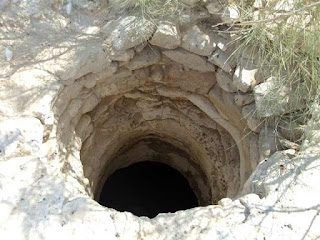 "My people have committed two sins:
"My people have committed two sins:They have forsaken me,
the spring of living water,
and have dug their own cisterns,
broken cisterns that cannot hold water"
(Jer. 2: 13).
Jeremiah's prophecy to Israel was directed at their constant temptation towards idolatry and away from total dependence on Yahweh, the God of Israel. The false idols of the surrounding pagan world were broken cisterns. And this problem describes perfectly the issues that lie at the heart of addiction, and indeed, the problem of sin itself.
A cistern was a kind of well. Essentially a huge jar was buried in the ground and filled with water to be used as an oasis and source of water in arid climates.
Imagine that you have been traveling in the desert and arrive at a cistern to water your flocks and take a long drink yourself--only to find that the cistern is broken and all the water has leaked out of it. The thing that promised to be a source of life may actually kill you since you now have to try to find another source of water. Will you make it to another cistern in time?
Gerald G. May, M.D. wrote a wonderful book, Addiction and Grace. In this book, he notes that we are all made by our Creator with a desire to attach to Him and that, ultimately, all of our other desires will be fulfilled only through that attachment. Addiction is the forming of an attachment to a substance or behavior in the hopes that it will "scratch the itch" that naturally exists whenever we are not connected to God. The substance or behavior is a broken cistern that cannot hold water. But we keep going to it, ignoring the source of true living water, in hopes that our thirst will be quenched.
Addiction itself is a perfect picture of sin and how it works to undermine our attachment to God. God stands by, the true source of living water. As Jesus said, "If anyone is thirsty, let him come to me and drink. Whoever believes in me, as the Scripture has said, streams of living water will flow from within him" (John 7: 37-38). But instead, we keep going to alcohol, drugs, food, work, TV, gambling, exercise, approval, etc. hoping to find our desire fulfilled. All of these things are broken cisterns.
This reveals the brilliance of the first three steps of Alcoholics Anonymous. First we must acknowledge our desperate helplessness to save ourselves. Then we must acknowledge that God exists and has the power to rescue us. Finally, we must surrender to Him, rather than struggle against the addiction. It is only in surrendering to God that we get in touch with the source of true living water that will satisfy our deepest desires.
Are you struggling with an unhealthy attachment to a "broken cistern?" Why not admit your powerlessness, acknowledge God's ability to meet your needs and surrender to Him today? It would also be helpful to get connected in a community of recovery people and lovers of Jesus who can help keep you coming to the spring of living water.



